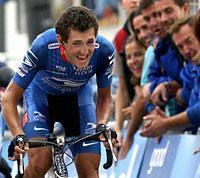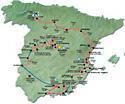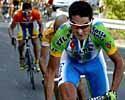
Recently on Cyclingnews.com |
59th Vuelta a España - GT
Spain, September 4-26, 2004
Exciting parcours promised for 2004 Vuelta a España
By Chris Henry
 |
(Spain - December 17, 2003): The Vuelta a España (Tour of Spain) has proven in recent years to be perhaps the most exciting grand tour. Overshadowed, like all races, by the Tour de France, the Vuelta makes up for its more modest stature by consistently providing an exciting parcours and varied, aggressive racing.
A trend towards shorter stage distances adopted in recent years has helped keep even the flat stages interesting with high speeds and frequent attacking, while Spain's regional diversity allows for placement of mountain stages at almost any point throughout the three week event. Anything but formulaic, the Vuelta has become an increasingly bigger target for the entire peloton, not just the top Spanish teams.
The 2004 edition, unveiled Wednesday by organisers Unipublic, isn't likely to disappoint. After the dramatic victory of Roberto Heras (US Postal Service-Berry Floor) sealed in the uphill time trial on the penultimate stage in the 2003 Vuelta, the heavy mixture of climbing and time trialing for 2004 could live up to the excitement of recent years.
The race begins once again with a team time trial, this time in the streets of León in northwest Spain. The course follows a steady southeastern flow to the eastern coast before turning south and working its way to Málaga. A short turn north to tackle the Sierra Nevada outside of Granada is followed by a rest day and transfer to the western edge of Spain near the Portuguese border, where the parcours picks up and returns to Madrid over the course of six exciting days of climbing. The final stage in Madrid will come down to a relatively short individual time trial of 30 kilometres that could once more prove decisive for the top step of the Vuelta podium.
The mountains of the Vuelta, and there are plenty, first appear in stage 5 with the Cat. 2 Alto de Torremiró. Stage 6 presents once again just one major mountain, before the serious work begins in stages 7 and 9. The ninth stage will test the peloton with three second category climbs leading up to a summit finish on the hors-categorie Alto de Aitana (1,510 metres).
 |
The most serious mountain stages of this year's race fall mainly in the second half of the three week event. The new climb to the observatory on Calar Alto is being dubbed by some the next Angliru, a brutally steep and uncharted ascent making its Vuelta debut. The climb itself, which will take the riders up to an elevation of 2,120 metres, is preceded by two first category mountains in the same day, no doubt offering the 12th stage as a possibly decisive moment in the 2004 Vuelta. The stage could be particularly difficult as it comes after the first rest day, when riders often experience a loss of rhythm following their day of relative leisure.
In fact, the four stages which fall between the Vuelta's two rest days should pack a strong punch, three of them being mountain days. Two days after the first crack at the Calar Alto, the field will face a two-climb day on stage 14, followed by the long individual time trial up the slopes of the Sierra Nevada on stage 15.
After the second rest day, which will surely be welcome by most, the Vuelta enters the final charge home to Madrid, including along the way four days of significant climbing. Stage 17 will be another decisive day, with two first category climbs, one second category, and a mountaintop finish on the hors-categorie climb to La Covatilla (1,960 metres). The next day three more climbs are included, but with a steady descent to the finish in Ávila, stage 18 is less likely to produce real time gaps.
 |
The final chance for the mountain men to claim their stake in the Vuelta comes on the race's penultimate day. As long as the general classification remains reasonably close among the leaders, stage 20 from La Vega de Alcobendas to the Puerto de Navacerrada promises plenty of down to the wire excitement with four first category climbs and the tough summit finish on the Navacerrada. All this with the knowledge that the race's final day will not be a ceremonial lap through Madrid, rather a 30 kilometre individual time trial- the third of the race- that previews the course to be used in the 2005 World Championships. No rider will take this stage for granted given the recent history of Vuelta titles being decided in the final race of truth.
The sprinters will get their chances too, but with only six flat stages compared to 11 stages in the middle and high mountains, this year's Vuelta is clearly catered to the mountain men. The battle for the 2004 points jersey will not automatically be a battle among the pure sprinters.
While too early to talk of the true race favourites, a number of team leaders will likely be reinvigorated for 2004 after a change of employer in this year's off season. Defending champion Roberto Heras, who left US Postal Service to lead Manolo Saiz's new Liberty Seguros team, will no doubt look for his third Vuelta win back at the helm of a Spanish team. Oscar Sevilla, still searching for his first title, has moved to Phonak to join Tyler Hamilton in an assault on the Tour de France and try his own chances in his national tour.
Aitor Gonzalez, winner in 2002, has already declared himself eager to make up for a substandard 2003 season with Fassa Bortolo, and will target the Tour and the Vuelta. Not to mention rising stars such as Alejandro Valverde, who distanced his Kelme team leader Sevilla in 2003 and more than compensated for Sevilla's difficulties after an early race crash to finish on the final podium in Madrid. Depending on his first Tour de France bid in the colours of French team Brioches La Boulangère, former ONCE leader Joseba Beloki may too be among the top contenders for the 2004 Vuelta crown.
Vuelta favourites expect a good race
With each route announcement for a grand tour comes a flood of reactions from the principal contenders for the next year's title. As the Vuelta a España becomes an increasingly popular race, more riders set the Spanish tour as an objective well before the season begins. Wednesday's unveiling of the 2004 Vuelta parcours prompted plenty of commentary in the Spanish press from the usual heads of state, several of whom will lead new teams next season, and each eager to tackle what is clearly a climber's Vuelta.
Roberto Heras (Liberty Seguros in 2004)
"With this parcours, which includes seven mountaintop finishes and four time trials, nobody will be able to relax. The climbers will have an advantage with the time trial up the Sierra Nevada, but overall it will be a hard Vuelta and very demanding."
Alejandro Valverde (Kelme-Costa Blanca)
"This past year I assumed the role of leader next to Oscar Sevilla, but next year it won't be a new experience," he explained, "which is why I feel ready to aim for the top step of the podium."
Isidro Nozal (Liberty Seguros in 2004)
"I like it because there's something for everyone: time trials and mountains. It'll be hard from start to finish."
Oscar Sevilla (Phonak Hearing Systems in 2004)
"Nobody has told me anything about these climbs," Sevilla commented in the Spanish paper Marca, referring to the climbs of Bacares and Calar Alto. "But it's tough terrain." "If [stage 16] finishes with these two climbs, it'll be a good fight because the Bacares will shatter the peloton in a thousand pieces and there's no time to regroup before the Calar Alto. The change in rhythm will be tough because there's not a metre of flat... The combination of the two climbs is what makes the difference."
Joseba Beloki (Brioches La Boulangère in 2004)
"It will be a complicated race, with possible traps in the wind as well as the mountains in the final week. For me the key will be the days from Granada to Madrid; it'll be important to arrive in top form at that point."
